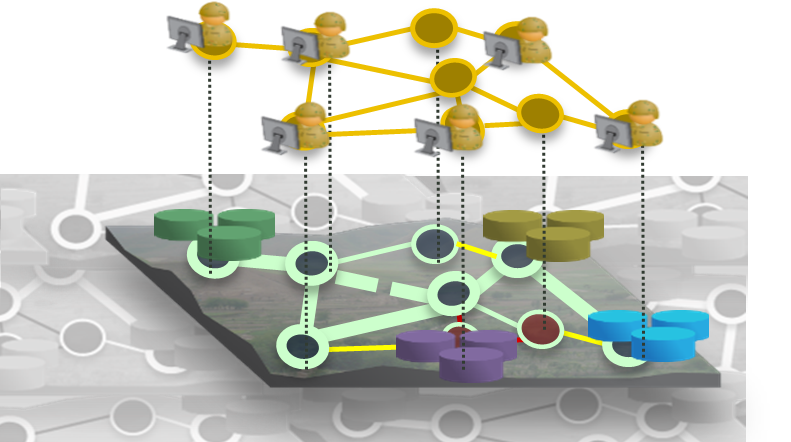Dynamic Placement of Distributed Analytics Services
Military / Coalition Issue
The dynamic coalition environments require the distributed analytics services be dynamically composed, deployed, and executed utilizing available (often limited) computation, storage, and communication resources, while satisfying the constraints imposed by coalition policies. To achieve the desired level of performance and reliability of the distributed analytics services, the analytics tasks and data objects must be flexibly placed on top of the resources whose availability fluctuate over time.
Core idea and key achievements
We have developed a set of algorithms to determine where to place analytics services and what services should be placed, in dynamically changing environments. Our algorithms have the following key characteristics:
- efficient execution with bounded time and space complexity;
- provable optimality guarantee in worst case scenarios;
- adaptable to system and user dynamics.
These results were obtained using analytical techniques from the fields of online learning, approximation algorithms, and optimization. Such guaranteed worst-case performance is very useful for ensuring expected system behaviour even in highly dynamic settings.

Implications for Defence
Current tactical analytics approaches use centrally located services requiring significant amounts of computing and networking resources. In the future, distributed analytics can significantly enhance coalition operations at the tactical edge, providing situation awareness for a variety of applications (e.g., ISR, C2). The techniques that we have developed will support agile analytics to soldiers in the field by dynamically placing services at suitable locations. Our algorithms have theoretical worst-case guarantees which ensure robustness in challenging environments.
Readiness & alternative Defence uses
A set of algorithms are described in published papers and many of them are also available as source code.
Resources and references
- He, Ting, et al. “It’s hard to share: Joint service placement and request scheduling in edge clouds with sharable and non-sharable resources.” 2018 IEEE 38th International Conference on Distributed Computing Systems (ICDCS). IEEE, 2018.
- Pasteris, Stephen, et al. “Maxhedge: Maximizing a maximum online.” The 22nd International Conference on Artificial Intelligence and Statistics. PMLR, 2019.
- Pasteris, Stephen, et al. “Service placement with provable guarantees in heterogeneous edge computing systems.” IEEE INFOCOM 2019-IEEE Conference on Computer Communications. IEEE, 2019.
- Farhadi, Vajiheh, et al. “Service placement and request scheduling for data-intensive applications in edge clouds.” IEEE/ACM Transactions on Networking 29.2 (2021): 779-792.
- Basu, Prithwish, et al. “Decentralized placement of data and analytics in wireless networks for energy-efficient execution.” IEEE INFOCOM 2020-IEEE Conference on Computer Communications. IEEE, 2020.
- Pasteris, Stephen, et al. “Online Learning of Facility Locations.” Algorithmic Learning Theory. PMLR, 2021.
Organisations
UCL, PSU, IBM US, BBN, Southampton, Yale, ARL